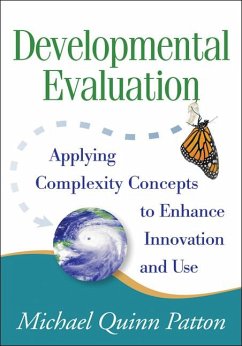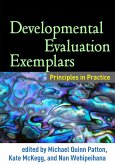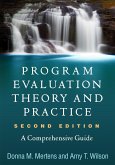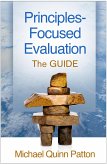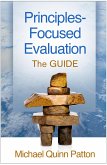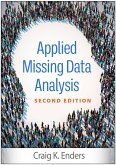Michael Quinn Patton
Developmental Evaluation
Applying Complexity Concepts to Enhance Innovation and Use
Michael Quinn Patton
Developmental Evaluation
Applying Complexity Concepts to Enhance Innovation and Use
- Broschiertes Buch
- Merkliste
- Auf die Merkliste
- Bewerten Bewerten
- Teilen
- Produkt teilen
- Produkterinnerung
- Produkterinnerung
Developmental evaluation (DE) offers a powerful approach to monitoring and supporting social innovations by working in partnership with program decision makers. In this book, eminent authority Michael Quinn Patton shows how to conduct evaluations within a DE framework. Patton draws on insights about complex dynamic systems, uncertainty, nonlinearity, and emergence. He illustrates how DE can be used for a range of purposes: ongoing program development, adapting effective principles of practice to local contexts, generating innovations and taking them to scale, and facilitating rapid response in…mehr
Andere Kunden interessierten sich auch für
![Developmental Evaluation Exemplars Developmental Evaluation Exemplars]() Developmental Evaluation Exemplars52,99 €
Developmental Evaluation Exemplars52,99 €![Evaluation Essentials Evaluation Essentials]() Marvin C. AlkinEvaluation Essentials66,99 €
Marvin C. AlkinEvaluation Essentials66,99 €![Program Evaluation Theory and Practice Program Evaluation Theory and Practice]() Donna M. MertensProgram Evaluation Theory and Practice104,99 €
Donna M. MertensProgram Evaluation Theory and Practice104,99 €![Blue Marble Evaluation Blue Marble Evaluation]() Michael Quinn PattonBlue Marble Evaluation58,99 €
Michael Quinn PattonBlue Marble Evaluation58,99 €![Principles-Focused Evaluation Principles-Focused Evaluation]() Michael Quinn PattonPrinciples-Focused Evaluation77,99 €
Michael Quinn PattonPrinciples-Focused Evaluation77,99 €![Principles-Focused Evaluation Principles-Focused Evaluation]() Michael Quinn PattonPrinciples-Focused Evaluation110,99 €
Michael Quinn PattonPrinciples-Focused Evaluation110,99 €![Applied Missing Data Analysis Applied Missing Data Analysis]() Craig K. Enders (United States Arizona State University)Applied Missing Data Analysis99,99 €
Craig K. Enders (United States Arizona State University)Applied Missing Data Analysis99,99 €-
-
-
Developmental evaluation (DE) offers a powerful approach to monitoring and supporting social innovations by working in partnership with program decision makers. In this book, eminent authority Michael Quinn Patton shows how to conduct evaluations within a DE framework. Patton draws on insights about complex dynamic systems, uncertainty, nonlinearity, and emergence. He illustrates how DE can be used for a range of purposes: ongoing program development, adapting effective principles of practice to local contexts, generating innovations and taking them to scale, and facilitating rapid response in crisis situations. Students and practicing evaluators will appreciate the book's extensive case examples and stories, cartoons, clear writing style, "closer look" sidebars, and summary tables. Provided is essential guidance for making evaluations useful, practical, and credible in support of social change.
Hinweis: Dieser Artikel kann nur an eine deutsche Lieferadresse ausgeliefert werden.
Hinweis: Dieser Artikel kann nur an eine deutsche Lieferadresse ausgeliefert werden.
Produktdetails
- Produktdetails
- Verlag: Guilford Publications
- Seitenzahl: 375
- Erscheinungstermin: 13. August 2010
- Englisch
- Abmessung: 254mm x 177mm x 24mm
- Gewicht: 688g
- ISBN-13: 9781606238721
- ISBN-10: 1606238728
- Artikelnr.: 29325649
- Herstellerkennzeichnung
- Libri GmbH
- Europaallee 1
- 36244 Bad Hersfeld
- gpsr@libri.de
- Verlag: Guilford Publications
- Seitenzahl: 375
- Erscheinungstermin: 13. August 2010
- Englisch
- Abmessung: 254mm x 177mm x 24mm
- Gewicht: 688g
- ISBN-13: 9781606238721
- ISBN-10: 1606238728
- Artikelnr.: 29325649
- Herstellerkennzeichnung
- Libri GmbH
- Europaallee 1
- 36244 Bad Hersfeld
- gpsr@libri.de
Michael Quinn Patton is an independent organizational development and program evaluation consultant. A former President of the American Evaluation Association (AEA), he teaches regularly in AEA's professional development workshops, The Evaluators' Institute, and The World Bank's International Program in Development Evaluation Training. Dr. Patton is a recipient of the Myrdal Award for Outstanding Contributions to Useful and Practical Evaluation Practice from the Evaluation Research Society and the Lazarsfeld Award for Lifelong Contributions to Evaluation Theory from the AEA.
1. Developmental Evaluation Defined and Positioned
*The Distinction Emerges
*Facing Complexity and Facing Reality: Or, Facing the Realities of
Complexity
*Developmental Evaluation and Complexity Theory
*Developmental Evaluation and Single-Loop versus Double-Loop Learning
*The Importance of Interpretive Frameworks
*Developmental Evaluation as Utilization-Focused
*Charting the Developmental Journey: Overview of the Book
*Five Developmental Evaluation Purposes and Uses
2. Developmental Evaluation as a Distinct Purpose and Niche
*Beyond Planning: Jumping into the Fire
*Evaluation Questions under These Different Engagement Scenarios
*Vision Encounters Reality: The Territory of Developmental Evaluation
*Systems Issues: Boundary Management as a Developmental Evaluation Focus
*Developing Innovations versus Improving and Testing Models: Developmental
Evaluation Distinguished from Formative and Summative Evaluation
*Ongoing Development Informed by Developmental Evaluation
*Strategic Thinking and Developmental Evaluation
*The Niche of Developmental Evaluation: Chapter Overview and Summary
3. Thinking Outside Evaluation's Boxes
*Creative Evaluation
*Of Plums and Prunes
*History and Biography as Context: The Personal Factor
*More History and Biography as Context
*Fundamental Principles
*Developmental Evaluation in Context
*External Evaluators and Developmental Evaluation
*Ten Key Points about Developmental Evaluation Illustrated by the Caribbean
Example
4. Situation Recognition and Responsiveness: Distinguishing Simple,
Complicated, and Complex
*Detecting Patterns
*Detecting Complexity as a Distinct Pattern and Territory for Inquiry
*The Challenges of Situation Recognition
*A Situation Recognition Heuristic: Distinguishing Simple, Complicated, and
Complex
*Situational Evaluation: Implications for Practice
*Variations on a Theme: The Cynefin Framework
5. Systems Thinking and Complexity Concepts for Developmental Evaluation
*From Train Brakeman to Locomotive Engineer to Evaluation Champion
*Project SleepBetter
*Systems Thinking
*Complexities of Complexity
*Useful Complexity Constructs for Developmental Evaluation
*Complexity-Sensitizing Concepts
6. How the World Is Changed: A Dialectic with Thesis and Antithesis and
Developmental Evaluation as the Synthesis
*Competing Perspectives on How the World Is Changed
*The Top-Down Approach
*Adaptation versus Replication: Principles for Developmental Evaluation
*Best Practices versus Effective Principles
*From the Grass Roots to the Adaptive Middle
*Alternative Approaches to Change
*Developmental Evaluation: The Action in the Muddled Middle
*Looking Back and Looking Forward
*Appendix 6.1. Positioning and Contrasting Developmental Evaluation with
Other Evaluation Approaches
7. The Adaptive Cycle and Developmental Evaluation
*Some Context for Understanding the Adaptive Cycle: Poetry, Ecology,
Sociology, Business, and Evaluation
*The Complexity Doorframe Redux
*Five Developmental Evaluation Purposes and Uses
*Resilience and Developmental Evaluation
*A Strategic Approach to Resilience: Engineering Resilience versus
Ecosystem Resilience
*The Adaptive Cycle
*The Adaptive Cycle and Psychosocial Regimes
*Evaluation and the Adaptive Cycle
*Through the Looking Glass of the Adaptive Cycle: Examples of
Organizational and Program Cycles
*Transitions and Traps
*Taking an Innovation to Scale: Challenges and Traps in Cross-Scale Change
*Panarchy: Cross-Scale Interactions
*Panarchy-Informed Evaluation: The Fact of a Doorframe
8. Developmental Evaluation Inquiry Frameworks
*Frameworks for Developmental Evaluation Inquiry
*Developmental Evaluation Inquiry Frameworks: Ten and Counting . . .
9. Developmental Evaluation Bricolage: Reflective Practice, Sensitizing
Concepts, Action Research, Abduction, Systems Change, and Retrospective
Developmental Evaluation
*Reflective Practice for Developmental Evaluation Inquiry and Engagement
*Sensitizing Concepts as a Focus for Reflective Practice and Developmental
Evaluation
*Kia ora
*Action Research and Developmental Evaluation
*Intersections of Developmental Evaluation and Action Research: A
Distinguished Evaluation Pioneer Reflects
*Reasoning and Developmental Evaluation
*In Praise of Methodological Diversity and Appropriateness: A Methods and
Tools Rant
*Systems Change and Developmental Evaluation
*Retrospective Developmental Evaluation
*Damiano's Retrospective Developmental Evaluation
*Developmental Evaluation Bricolage
10. Utilization-Focused Developmental Evaluation: Engagement Practices,
Diverse Designs, and Adaptive Methods
*Different Kinds of Developmental Evaluation
*Diversity of Design and Methods Options
*Utilization-Focused Developmental Evaluation
*Ten Utilization-Focused Developmental Evaluation Design Examples
*Developmental Evaluation Engagement, Design, and Methods Summary
*The First Developmental Evaluation: A Creation Story
*The Distinction Emerges
*Facing Complexity and Facing Reality: Or, Facing the Realities of
Complexity
*Developmental Evaluation and Complexity Theory
*Developmental Evaluation and Single-Loop versus Double-Loop Learning
*The Importance of Interpretive Frameworks
*Developmental Evaluation as Utilization-Focused
*Charting the Developmental Journey: Overview of the Book
*Five Developmental Evaluation Purposes and Uses
2. Developmental Evaluation as a Distinct Purpose and Niche
*Beyond Planning: Jumping into the Fire
*Evaluation Questions under These Different Engagement Scenarios
*Vision Encounters Reality: The Territory of Developmental Evaluation
*Systems Issues: Boundary Management as a Developmental Evaluation Focus
*Developing Innovations versus Improving and Testing Models: Developmental
Evaluation Distinguished from Formative and Summative Evaluation
*Ongoing Development Informed by Developmental Evaluation
*Strategic Thinking and Developmental Evaluation
*The Niche of Developmental Evaluation: Chapter Overview and Summary
3. Thinking Outside Evaluation's Boxes
*Creative Evaluation
*Of Plums and Prunes
*History and Biography as Context: The Personal Factor
*More History and Biography as Context
*Fundamental Principles
*Developmental Evaluation in Context
*External Evaluators and Developmental Evaluation
*Ten Key Points about Developmental Evaluation Illustrated by the Caribbean
Example
4. Situation Recognition and Responsiveness: Distinguishing Simple,
Complicated, and Complex
*Detecting Patterns
*Detecting Complexity as a Distinct Pattern and Territory for Inquiry
*The Challenges of Situation Recognition
*A Situation Recognition Heuristic: Distinguishing Simple, Complicated, and
Complex
*Situational Evaluation: Implications for Practice
*Variations on a Theme: The Cynefin Framework
5. Systems Thinking and Complexity Concepts for Developmental Evaluation
*From Train Brakeman to Locomotive Engineer to Evaluation Champion
*Project SleepBetter
*Systems Thinking
*Complexities of Complexity
*Useful Complexity Constructs for Developmental Evaluation
*Complexity-Sensitizing Concepts
6. How the World Is Changed: A Dialectic with Thesis and Antithesis and
Developmental Evaluation as the Synthesis
*Competing Perspectives on How the World Is Changed
*The Top-Down Approach
*Adaptation versus Replication: Principles for Developmental Evaluation
*Best Practices versus Effective Principles
*From the Grass Roots to the Adaptive Middle
*Alternative Approaches to Change
*Developmental Evaluation: The Action in the Muddled Middle
*Looking Back and Looking Forward
*Appendix 6.1. Positioning and Contrasting Developmental Evaluation with
Other Evaluation Approaches
7. The Adaptive Cycle and Developmental Evaluation
*Some Context for Understanding the Adaptive Cycle: Poetry, Ecology,
Sociology, Business, and Evaluation
*The Complexity Doorframe Redux
*Five Developmental Evaluation Purposes and Uses
*Resilience and Developmental Evaluation
*A Strategic Approach to Resilience: Engineering Resilience versus
Ecosystem Resilience
*The Adaptive Cycle
*The Adaptive Cycle and Psychosocial Regimes
*Evaluation and the Adaptive Cycle
*Through the Looking Glass of the Adaptive Cycle: Examples of
Organizational and Program Cycles
*Transitions and Traps
*Taking an Innovation to Scale: Challenges and Traps in Cross-Scale Change
*Panarchy: Cross-Scale Interactions
*Panarchy-Informed Evaluation: The Fact of a Doorframe
8. Developmental Evaluation Inquiry Frameworks
*Frameworks for Developmental Evaluation Inquiry
*Developmental Evaluation Inquiry Frameworks: Ten and Counting . . .
9. Developmental Evaluation Bricolage: Reflective Practice, Sensitizing
Concepts, Action Research, Abduction, Systems Change, and Retrospective
Developmental Evaluation
*Reflective Practice for Developmental Evaluation Inquiry and Engagement
*Sensitizing Concepts as a Focus for Reflective Practice and Developmental
Evaluation
*Kia ora
*Action Research and Developmental Evaluation
*Intersections of Developmental Evaluation and Action Research: A
Distinguished Evaluation Pioneer Reflects
*Reasoning and Developmental Evaluation
*In Praise of Methodological Diversity and Appropriateness: A Methods and
Tools Rant
*Systems Change and Developmental Evaluation
*Retrospective Developmental Evaluation
*Damiano's Retrospective Developmental Evaluation
*Developmental Evaluation Bricolage
10. Utilization-Focused Developmental Evaluation: Engagement Practices,
Diverse Designs, and Adaptive Methods
*Different Kinds of Developmental Evaluation
*Diversity of Design and Methods Options
*Utilization-Focused Developmental Evaluation
*Ten Utilization-Focused Developmental Evaluation Design Examples
*Developmental Evaluation Engagement, Design, and Methods Summary
*The First Developmental Evaluation: A Creation Story
1. Developmental Evaluation Defined and Positioned
*The Distinction Emerges
*Facing Complexity and Facing Reality: Or, Facing the Realities of
Complexity
*Developmental Evaluation and Complexity Theory
*Developmental Evaluation and Single-Loop versus Double-Loop Learning
*The Importance of Interpretive Frameworks
*Developmental Evaluation as Utilization-Focused
*Charting the Developmental Journey: Overview of the Book
*Five Developmental Evaluation Purposes and Uses
2. Developmental Evaluation as a Distinct Purpose and Niche
*Beyond Planning: Jumping into the Fire
*Evaluation Questions under These Different Engagement Scenarios
*Vision Encounters Reality: The Territory of Developmental Evaluation
*Systems Issues: Boundary Management as a Developmental Evaluation Focus
*Developing Innovations versus Improving and Testing Models: Developmental
Evaluation Distinguished from Formative and Summative Evaluation
*Ongoing Development Informed by Developmental Evaluation
*Strategic Thinking and Developmental Evaluation
*The Niche of Developmental Evaluation: Chapter Overview and Summary
3. Thinking Outside Evaluation's Boxes
*Creative Evaluation
*Of Plums and Prunes
*History and Biography as Context: The Personal Factor
*More History and Biography as Context
*Fundamental Principles
*Developmental Evaluation in Context
*External Evaluators and Developmental Evaluation
*Ten Key Points about Developmental Evaluation Illustrated by the Caribbean
Example
4. Situation Recognition and Responsiveness: Distinguishing Simple,
Complicated, and Complex
*Detecting Patterns
*Detecting Complexity as a Distinct Pattern and Territory for Inquiry
*The Challenges of Situation Recognition
*A Situation Recognition Heuristic: Distinguishing Simple, Complicated, and
Complex
*Situational Evaluation: Implications for Practice
*Variations on a Theme: The Cynefin Framework
5. Systems Thinking and Complexity Concepts for Developmental Evaluation
*From Train Brakeman to Locomotive Engineer to Evaluation Champion
*Project SleepBetter
*Systems Thinking
*Complexities of Complexity
*Useful Complexity Constructs for Developmental Evaluation
*Complexity-Sensitizing Concepts
6. How the World Is Changed: A Dialectic with Thesis and Antithesis and
Developmental Evaluation as the Synthesis
*Competing Perspectives on How the World Is Changed
*The Top-Down Approach
*Adaptation versus Replication: Principles for Developmental Evaluation
*Best Practices versus Effective Principles
*From the Grass Roots to the Adaptive Middle
*Alternative Approaches to Change
*Developmental Evaluation: The Action in the Muddled Middle
*Looking Back and Looking Forward
*Appendix 6.1. Positioning and Contrasting Developmental Evaluation with
Other Evaluation Approaches
7. The Adaptive Cycle and Developmental Evaluation
*Some Context for Understanding the Adaptive Cycle: Poetry, Ecology,
Sociology, Business, and Evaluation
*The Complexity Doorframe Redux
*Five Developmental Evaluation Purposes and Uses
*Resilience and Developmental Evaluation
*A Strategic Approach to Resilience: Engineering Resilience versus
Ecosystem Resilience
*The Adaptive Cycle
*The Adaptive Cycle and Psychosocial Regimes
*Evaluation and the Adaptive Cycle
*Through the Looking Glass of the Adaptive Cycle: Examples of
Organizational and Program Cycles
*Transitions and Traps
*Taking an Innovation to Scale: Challenges and Traps in Cross-Scale Change
*Panarchy: Cross-Scale Interactions
*Panarchy-Informed Evaluation: The Fact of a Doorframe
8. Developmental Evaluation Inquiry Frameworks
*Frameworks for Developmental Evaluation Inquiry
*Developmental Evaluation Inquiry Frameworks: Ten and Counting . . .
9. Developmental Evaluation Bricolage: Reflective Practice, Sensitizing
Concepts, Action Research, Abduction, Systems Change, and Retrospective
Developmental Evaluation
*Reflective Practice for Developmental Evaluation Inquiry and Engagement
*Sensitizing Concepts as a Focus for Reflective Practice and Developmental
Evaluation
*Kia ora
*Action Research and Developmental Evaluation
*Intersections of Developmental Evaluation and Action Research: A
Distinguished Evaluation Pioneer Reflects
*Reasoning and Developmental Evaluation
*In Praise of Methodological Diversity and Appropriateness: A Methods and
Tools Rant
*Systems Change and Developmental Evaluation
*Retrospective Developmental Evaluation
*Damiano's Retrospective Developmental Evaluation
*Developmental Evaluation Bricolage
10. Utilization-Focused Developmental Evaluation: Engagement Practices,
Diverse Designs, and Adaptive Methods
*Different Kinds of Developmental Evaluation
*Diversity of Design and Methods Options
*Utilization-Focused Developmental Evaluation
*Ten Utilization-Focused Developmental Evaluation Design Examples
*Developmental Evaluation Engagement, Design, and Methods Summary
*The First Developmental Evaluation: A Creation Story
*The Distinction Emerges
*Facing Complexity and Facing Reality: Or, Facing the Realities of
Complexity
*Developmental Evaluation and Complexity Theory
*Developmental Evaluation and Single-Loop versus Double-Loop Learning
*The Importance of Interpretive Frameworks
*Developmental Evaluation as Utilization-Focused
*Charting the Developmental Journey: Overview of the Book
*Five Developmental Evaluation Purposes and Uses
2. Developmental Evaluation as a Distinct Purpose and Niche
*Beyond Planning: Jumping into the Fire
*Evaluation Questions under These Different Engagement Scenarios
*Vision Encounters Reality: The Territory of Developmental Evaluation
*Systems Issues: Boundary Management as a Developmental Evaluation Focus
*Developing Innovations versus Improving and Testing Models: Developmental
Evaluation Distinguished from Formative and Summative Evaluation
*Ongoing Development Informed by Developmental Evaluation
*Strategic Thinking and Developmental Evaluation
*The Niche of Developmental Evaluation: Chapter Overview and Summary
3. Thinking Outside Evaluation's Boxes
*Creative Evaluation
*Of Plums and Prunes
*History and Biography as Context: The Personal Factor
*More History and Biography as Context
*Fundamental Principles
*Developmental Evaluation in Context
*External Evaluators and Developmental Evaluation
*Ten Key Points about Developmental Evaluation Illustrated by the Caribbean
Example
4. Situation Recognition and Responsiveness: Distinguishing Simple,
Complicated, and Complex
*Detecting Patterns
*Detecting Complexity as a Distinct Pattern and Territory for Inquiry
*The Challenges of Situation Recognition
*A Situation Recognition Heuristic: Distinguishing Simple, Complicated, and
Complex
*Situational Evaluation: Implications for Practice
*Variations on a Theme: The Cynefin Framework
5. Systems Thinking and Complexity Concepts for Developmental Evaluation
*From Train Brakeman to Locomotive Engineer to Evaluation Champion
*Project SleepBetter
*Systems Thinking
*Complexities of Complexity
*Useful Complexity Constructs for Developmental Evaluation
*Complexity-Sensitizing Concepts
6. How the World Is Changed: A Dialectic with Thesis and Antithesis and
Developmental Evaluation as the Synthesis
*Competing Perspectives on How the World Is Changed
*The Top-Down Approach
*Adaptation versus Replication: Principles for Developmental Evaluation
*Best Practices versus Effective Principles
*From the Grass Roots to the Adaptive Middle
*Alternative Approaches to Change
*Developmental Evaluation: The Action in the Muddled Middle
*Looking Back and Looking Forward
*Appendix 6.1. Positioning and Contrasting Developmental Evaluation with
Other Evaluation Approaches
7. The Adaptive Cycle and Developmental Evaluation
*Some Context for Understanding the Adaptive Cycle: Poetry, Ecology,
Sociology, Business, and Evaluation
*The Complexity Doorframe Redux
*Five Developmental Evaluation Purposes and Uses
*Resilience and Developmental Evaluation
*A Strategic Approach to Resilience: Engineering Resilience versus
Ecosystem Resilience
*The Adaptive Cycle
*The Adaptive Cycle and Psychosocial Regimes
*Evaluation and the Adaptive Cycle
*Through the Looking Glass of the Adaptive Cycle: Examples of
Organizational and Program Cycles
*Transitions and Traps
*Taking an Innovation to Scale: Challenges and Traps in Cross-Scale Change
*Panarchy: Cross-Scale Interactions
*Panarchy-Informed Evaluation: The Fact of a Doorframe
8. Developmental Evaluation Inquiry Frameworks
*Frameworks for Developmental Evaluation Inquiry
*Developmental Evaluation Inquiry Frameworks: Ten and Counting . . .
9. Developmental Evaluation Bricolage: Reflective Practice, Sensitizing
Concepts, Action Research, Abduction, Systems Change, and Retrospective
Developmental Evaluation
*Reflective Practice for Developmental Evaluation Inquiry and Engagement
*Sensitizing Concepts as a Focus for Reflective Practice and Developmental
Evaluation
*Kia ora
*Action Research and Developmental Evaluation
*Intersections of Developmental Evaluation and Action Research: A
Distinguished Evaluation Pioneer Reflects
*Reasoning and Developmental Evaluation
*In Praise of Methodological Diversity and Appropriateness: A Methods and
Tools Rant
*Systems Change and Developmental Evaluation
*Retrospective Developmental Evaluation
*Damiano's Retrospective Developmental Evaluation
*Developmental Evaluation Bricolage
10. Utilization-Focused Developmental Evaluation: Engagement Practices,
Diverse Designs, and Adaptive Methods
*Different Kinds of Developmental Evaluation
*Diversity of Design and Methods Options
*Utilization-Focused Developmental Evaluation
*Ten Utilization-Focused Developmental Evaluation Design Examples
*Developmental Evaluation Engagement, Design, and Methods Summary
*The First Developmental Evaluation: A Creation Story

